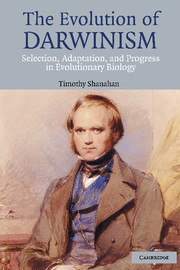Book contents
- Frontmatter
- Contents
- Introduction
- I SELECTION
- II ADAPTATION
- III PROGRESS
- 7 Darwin on Evolutionary Progress
- 8 Evolutionary Progress from Darwin to Dawkins
- 9 Is Evolution Progressive?
- 10 Human Physical and Mental Evolution
- Epilogue
- Appendix: What Did Darwin Really Believe About Evolutionary Progress?
- Notes
- References
- Index
9 - Is Evolution Progressive?
Published online by Cambridge University Press: 18 December 2009
- Frontmatter
- Contents
- Introduction
- I SELECTION
- II ADAPTATION
- III PROGRESS
- 7 Darwin on Evolutionary Progress
- 8 Evolutionary Progress from Darwin to Dawkins
- 9 Is Evolution Progressive?
- 10 Human Physical and Mental Evolution
- Epilogue
- Appendix: What Did Darwin Really Believe About Evolutionary Progress?
- Notes
- References
- Index
Summary
Each species changes[.] [D]oes it progress? … [T]he simplest cannot help becoming more complicated; & if we look to first origin[,] there must be progress.
(Darwin, B Notebook, p. 18; in Barrett et al. 1987, p. 175)Introduction
As we have seen, the idea that evolution manifests progress has long been problematic for Darwinians. On the one hand, the history of life appears to be the story of the gradual emergence of higher, more advanced life forms. Thus evolution appears to embody spectacular biological progress. On the other hand, every supposed example of evolutionary progress is confronted with a counterexample. Alongside masterpieces of biological engineering are organisms with flawed designs, creatures that have changed little in millions of years, and even creatures that have apparently regressed to structurally simpler forms, confounding the claim that evolution is ever onward and upward. Evolutionary progress is also suspect on theoretical grounds. Natural selection contains no inherent perfecting mechanism, but only insures that organisms will be relatively well adapted to whatever local environment their immediate ancestors occupied. As environments change, organisms will either track them or go extinct, but there is no reason to assume that this change represents consistent advance in any particular direction. Finally, the idea of evolutionary progress has been subjected to philosophical critique as well. In particular, “progress” has seemed too anthropocentric, value-laden, and subjective to be considered a respectable scientific concept, and has thus been dismissed as merely symptomatic of various historical or social factors lacking any epistemic force (Gould 1988a; Ruse 1996).
- Type
- Chapter
- Information
- The Evolution of DarwinismSelection, Adaptation and Progress in Evolutionary Biology, pp. 220 - 246Publisher: Cambridge University PressPrint publication year: 2004



